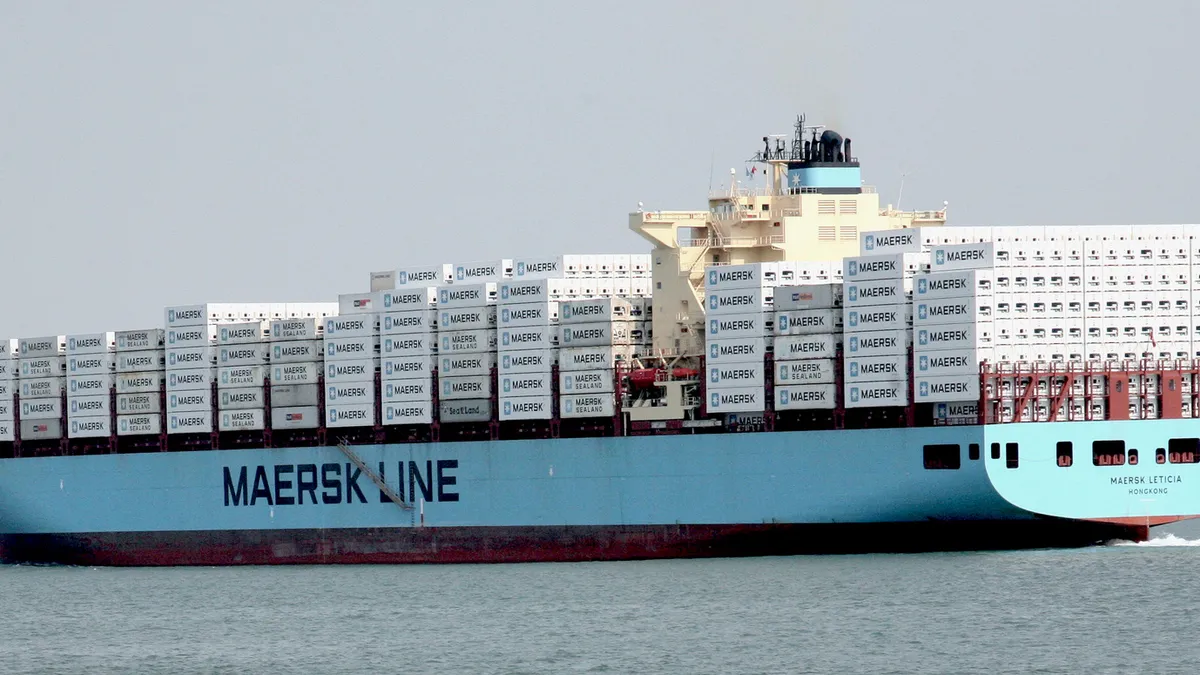Dive Brief:
- The coronavirus has caused the drop in shipping demand to shift from China to Europe and carriers have announced new blank sailings, including 10 along the Transpacific route and five on European routes, according to numbers provided by Sea-Intelligence.
- Maersk announced three new blank sailings this week that would have served trade on European, Mediterranean and Transpacific routes. "In relation to the COVID-19 effect in Europe, we have seen a further reduction in demand," the carrier said in an advisory.
- "So far the [coronavirus] has had only limited impact on our business, but we expect a significant effect of the virus on global container traffic in the months to come, and if this happens we will have to make some adjustments to the network," Hapag-Lloyd CEO Rolf Habben Jansen said in a note to customers earlier this week.
Dive Insight:
At the beginning of every year, carriers announce blank sailings that coincide with Chinese New Year. In 2020, that number surged beyond what is normally expected, as factories in China remained shuttered as a result of the coronavirus outbreak.
Now, blank sailings have entered a third phase associated with the impact of the global pandemic and lower consumer demand, Sea-Intelligence CEO Alan Murphy told Supply Chain Dive in an interview.
"We're now in a different situation," Murphy said. "Production is back up in China, largely."
But now demand for shipping is decreasing along some routes because economies around the world are paused, due to quarantines and social distancing measures.
Ocean shipping can be impacted by changes in either side of the supply and demand equation. Factories shutting down in China hit freight supply and now carriers are dealing with a decrease in demand, according to Xeneta CEO Patrik Berglund.
"If you close down one of the sides, whether the buyer or the seller side, you're creating problems for the shipping lines and then for the supply chain," Berglund said in an interview with Supply Chain Dive.
Ocean shippers blanked 44 sailings as a result of Chinese factories getting shut down and reducing supply. The number of blank sailings in the demand-side phase hasn't yet reached that level, but it's expected to been seen on more routes, Murphy said.
It is "far from the magnitude that we saw both from Chinese New Year and in the weeks after when we saw the supply impact out of China," he said. "But that might change in the coming weeks as the impact on demand grows."
Berglund, whose company works with large shippers to understand ocean and air rates, said the next phase "is gonna be as painful, I believe, as the previous period has been already. So, I don't think we've seen the full effects."
Multiple carriers have enacted force majeure clauses, which means they might not live up to the contract they had in place and will instead take the price they can get in a more spot market environment, Berglund said.
"This is what the shippers are struggling with," he said, calling the current environment a "pay-to-play" market.
"On average, a big company might pay $300-$400 moving a 40-foot box back from Europe to Asia, even down to $150-$200 for the biggest players," he said. "But what happened now is that this spot market, which was around $400 or $500 before this started — the market is now at $1,200. So, the cost increase you've seen for some of these big volume players is immense."
On the other side of the equation are the shippers who need to cancel shipments as they see a decrease in demand. Ross, for example, sent a letter to its vendors to tell them it is calling off all purchase orders through June 18, according to Reuters.
How hard will it be for shippers to cancel shipments with carriers? It's hard to say and it depends on everything from the size of the shipper to its relationship with the carrier, Murphy said.
Many shippers who have contacts with their carriers will have a minimum quantity commitment (MQC) outlining a minimum amount of freight they need to carry with that carrier. The MQC will also include a dead freight clause that outlines how much money shippers will owe if they don't meet the MQC, but these are rarely enforced, Murphy said.
"It's conventional wisdom that shipping lines cannot enforce their dead freight clauses," he said.














